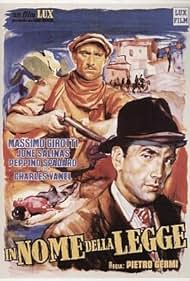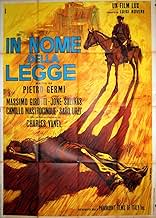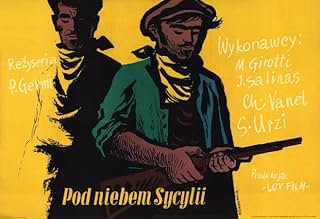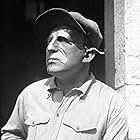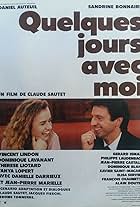A young, by-the-book judge is appointed to a Sicilian village controlled by corrupt leaders and the Mafia.A young, by-the-book judge is appointed to a Sicilian village controlled by corrupt leaders and the Mafia.A young, by-the-book judge is appointed to a Sicilian village controlled by corrupt leaders and the Mafia.
- Awards
- 3 wins
Gualtiero De Angelis
- Narratore
- (uncredited)
Bernardo Indelicato
- Paolino
- (uncredited)
Guido Medici
- Il procuratore di Palermo
- (uncredited)
Storyline
Did you know
- TriviaOriginal literary work: "Piccola preture", novel by Giuseppe Guido Loschiavo, Colombo Publishers, Rome, 1948, 287 p.
- ConnectionsEdited into Lo schermo a tre punte (1995)
Featured review
Giuseppe Guido lo Schiavo based his 'Piccola Pretura' on his experiences as a praetor in Barrafranca, Sicily. Its potential was quickly spotted and Pietro Germi's film was released the following year.
When Massimo Girotti's black-suited and hatted Judge Guido steps off the coach into a bleached landscape one thinks of Spencer Tracy's man with a mission in 'Bad Day at Black Rock' from 1957. Like Sturges' film this is a mixture of Western and Film Noir. There is also a passing nod to John Ford and Carlo Rustichelli's stirring music that accompanies the Mafiosi on horseback further heightens the Western feel. The town marshall is played by Germi regular Saro Urzi and the local landowning Baron by Camillo Mastrocinque.
The obligatory bandit chief has here become the Mafia 'Boss' of Charles Vanel, superb as always but not very convincingly dubbed.
The judge is a man of unimpeachable principles and moral integrity and as such could easily be a one-dimensional bore. This is not the case here however as Massimo Girotti is both a strong leading man and an excellent actor whilst the film's emotional balance is fulfilled by his attraction to the baron's cultured and deeply unhappy wife, played by the ravishing Jone Salinas.
Guido feels powerless to achieve his noble intentions in the face of corruption, complacency and fear and just when he is about to throw in the towel and go off with the baroness, the murder of an innocent young man is committed. Could this be the catalyst that brings opposing forces together.......?
This powerful piece is wonderfully shot by Germi's chosen cinematographer Leonida Barboni and the screenplay is by Fellini and Monicelli. The assistant director is Enzo Provenzale who went on to direct his own Mafia-themed 'Vento del Sud'.
The optimistic finale was shown in 'Cinema Paradiso' and loudly applauded, understandably so as it gives the impression that Justice will prevail.
History has a habit though of teaching us that the more things change, the more they remain the same!
When Massimo Girotti's black-suited and hatted Judge Guido steps off the coach into a bleached landscape one thinks of Spencer Tracy's man with a mission in 'Bad Day at Black Rock' from 1957. Like Sturges' film this is a mixture of Western and Film Noir. There is also a passing nod to John Ford and Carlo Rustichelli's stirring music that accompanies the Mafiosi on horseback further heightens the Western feel. The town marshall is played by Germi regular Saro Urzi and the local landowning Baron by Camillo Mastrocinque.
The obligatory bandit chief has here become the Mafia 'Boss' of Charles Vanel, superb as always but not very convincingly dubbed.
The judge is a man of unimpeachable principles and moral integrity and as such could easily be a one-dimensional bore. This is not the case here however as Massimo Girotti is both a strong leading man and an excellent actor whilst the film's emotional balance is fulfilled by his attraction to the baron's cultured and deeply unhappy wife, played by the ravishing Jone Salinas.
Guido feels powerless to achieve his noble intentions in the face of corruption, complacency and fear and just when he is about to throw in the towel and go off with the baroness, the murder of an innocent young man is committed. Could this be the catalyst that brings opposing forces together.......?
This powerful piece is wonderfully shot by Germi's chosen cinematographer Leonida Barboni and the screenplay is by Fellini and Monicelli. The assistant director is Enzo Provenzale who went on to direct his own Mafia-themed 'Vento del Sud'.
The optimistic finale was shown in 'Cinema Paradiso' and loudly applauded, understandably so as it gives the impression that Justice will prevail.
History has a habit though of teaching us that the more things change, the more they remain the same!
- brogmiller
- Jul 19, 2021
- Permalink
Details
- Runtime1 hour 40 minutes
- Color
- Sound mix
- Aspect ratio
- 1.37 : 1
Contribute to this page
Suggest an edit or add missing content

Top Gap
By what name was In the Name of the Law (1949) officially released in India in English?
Answer